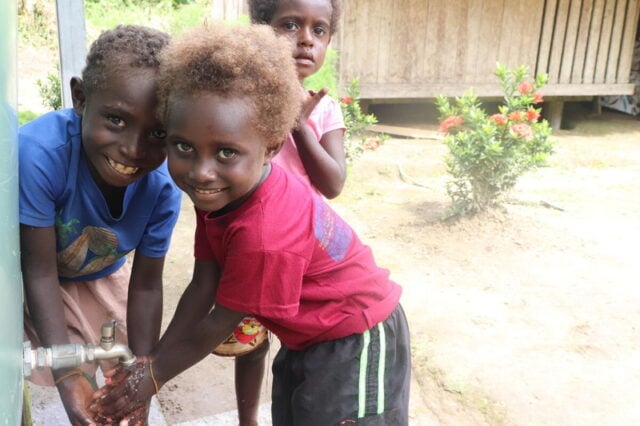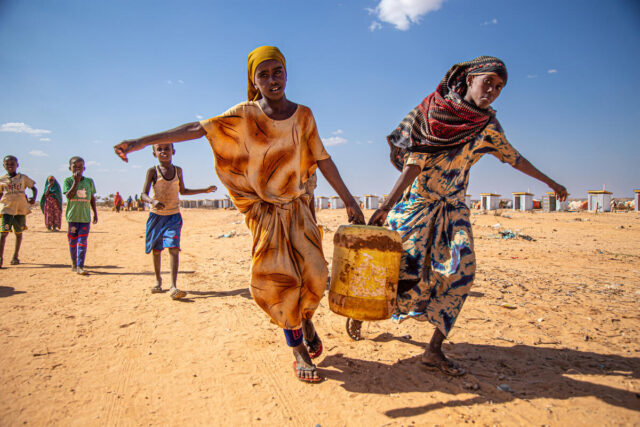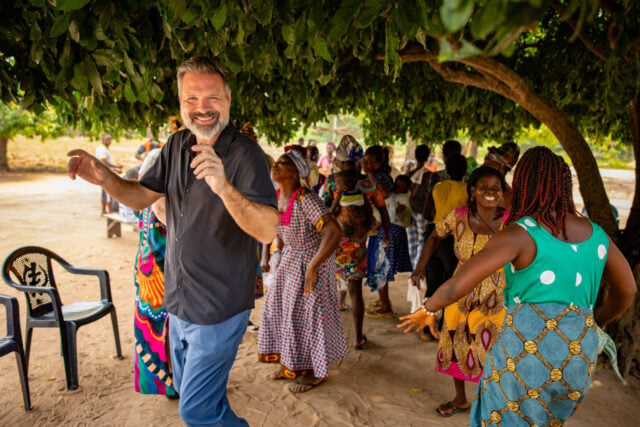In Kesot village in Kenya, as in so many other places in sub-Saharan Africa, people used to struggle every day to get water — any water. Even at 5 years old, Cheru Lotuliapus not only understood this struggle, she lived it.
Each morning, Cheru walked nearly two hours and then dug for water in a dry riverbed, competing with thirsty goats and camels.
Without clean water, life was difficult. She and her siblings were sometimes too sick or tired to go to school. The local church frequently sat empty.
But life has changed for Cheru, now 6. With World Vision’s help, her community built a pipeline that brings clean water down from a mountain spring.
Around the world, more communities like Cheru’s are awash in hope. World Vision is reaching one new person every 10 seconds and three more schools every day with clean water.
Morning dawns on the steep, densely wooded hillside where crystal-clear water bubbles from a spring. Sixteen kilometers (nearly 10 miles) away in the lowlands, Cheru fills her cup with that same cool water as it flows from the spigot near her home.
“This water tastes good,” she says.
She holds her 7-month-old brother, Sote, while their mother, Monica, stitches the pocket on her yellow school shirt. Cheru helps her mother with the laundry, dishes, and baby-sitting, but the one chore she doesn’t do anymore is carry water. With a water kiosk just a few steps away, it’s easy enough for Monica to keep jerrycans full of clean water on her doorstep.
“I like to help, and I like to be clean,” says Cheru, handing back the baby and putting on her freshly-laundered shirt. Neatly dressed and with her face washed, Cheru eagerly joins a troop of children on their way to school. Holding hands and skipping, they set out on the 2-kilometer walk.
Cheru’s father, Samson, watches proudly as the children head down the dirt road. He already sees a better future for them. “We’ve had water for a month, and it’s brought us great peace,” he says. “We have time and energy for other things.”
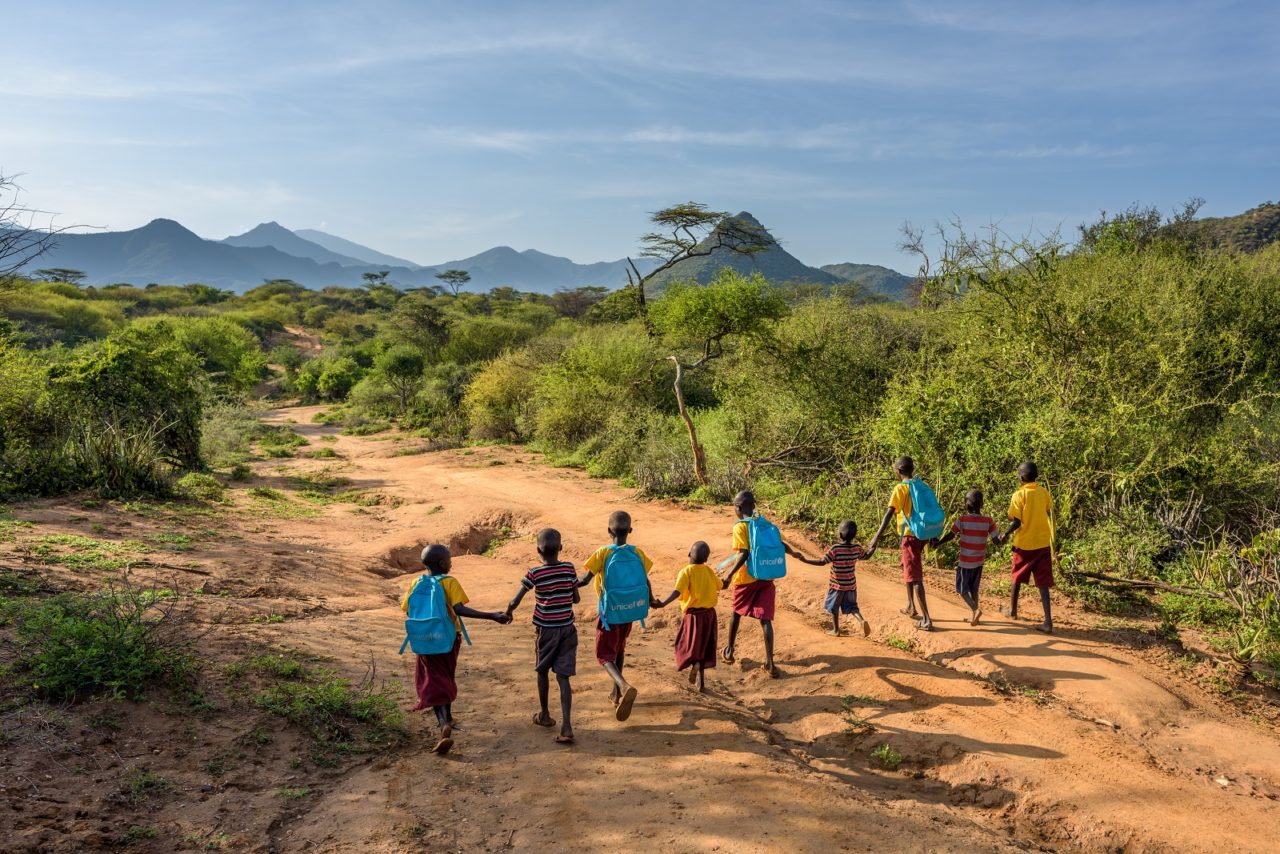
An open door for education
Access to clean water means that Cheru — healthy, clean, and rested — can consistently attend school. Once she arrives at Kesot Primary School, she’s welcomed by head teacher John Dungo, 34.
He’s noticed that with clean water also available at the three primary schools along the pipeline, many more students like Cheru are coming regularly — and classes are overflowing. John says that they’re building new classrooms to accommodate the influx in attendance.
When class begins, Cheru is quick to raise her hand to answer questions and shouts “one, two, three …” when the class counts in English.
“I love school,” she says. Writing and drawing are her favorite subjects.
The three primary schools now have water tanks, standpipes with two spigots, and four latrines each for boys and girls, including an accessible unit for children who are disabled. Outside the latrines are sinks with running water for handwashing. It’s the first year Cheru and her classmates have clean, plentiful water at school. They are also beginning to learn about hygiene and health.
The head teachers of the three primary schools received hygiene training and materials from World Vision and organized hygiene and sanitation clubs for their students. They also host community meetings where adults learn about the importance of keeping clean and building and using family toilets.
“Children who know and practice good hygiene are excellent advocates with their parents,” says Clement Limaki, 45, head teacher at nearby Chepolet Primary School.
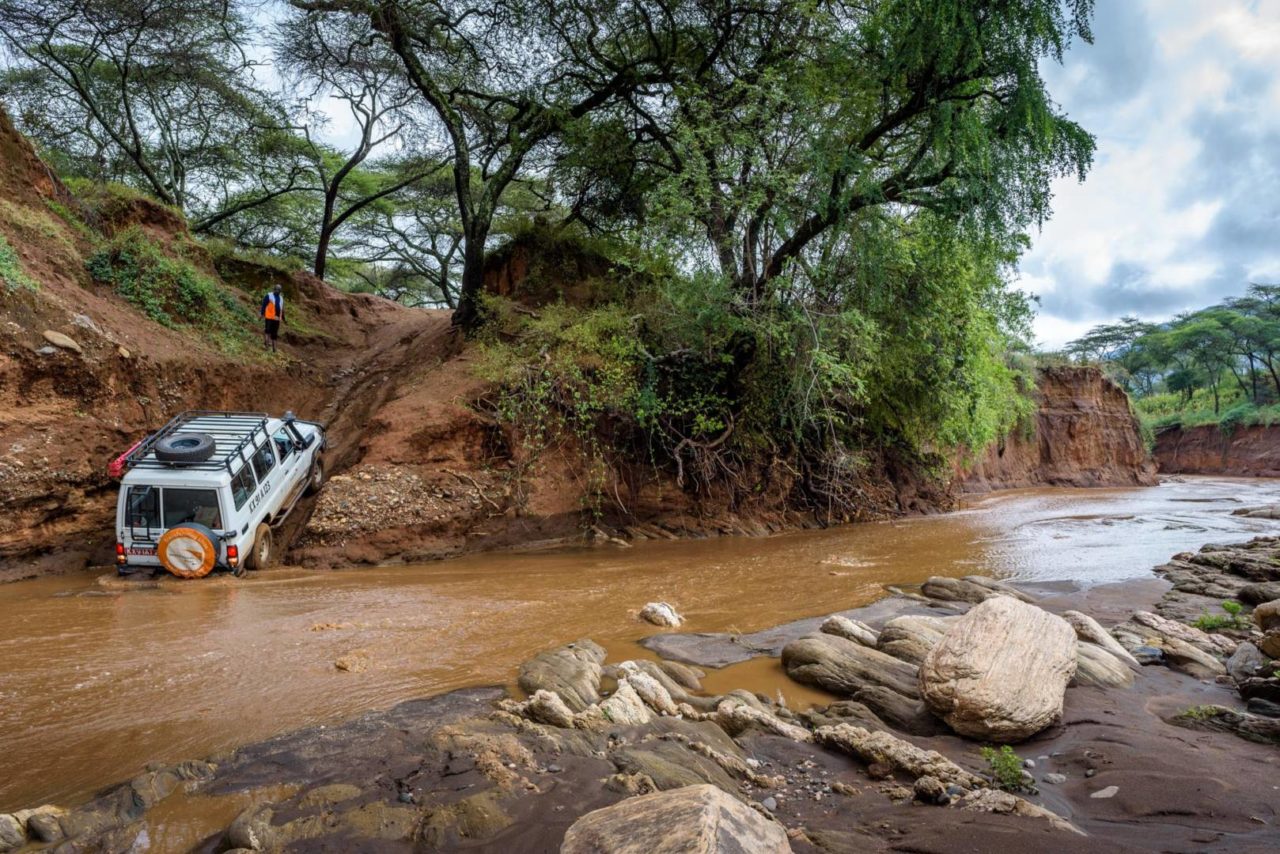
Water flows from the mountaintop
Charles Kakiti, a World Vision water engineer, was discouraged by his first sight of the dry, barren land and struggling people. The West Pokot county water department had started a water project here some years back. They tapped a water source and began laying a pipeline. However, the project ran into financial trouble, and clean water never flowed.
“It wasn’t easy to get water to this dry place,” says Charles. The road was so bad that it seemed impossible to finish the project. However, when he saw clean water gushing from a spring in the hills, his attitude changed.
“God has blessed this place with everything that’s needed for people and animals to live a good life,” he says. But it would take organization, cooperation, hard work, and perseverance to bring water down from the mountaintop.
Charles and Abu Lokilimak, a World Vision project manager, began the project in faith and uplifted in prayer. They organized the water committee with five representatives each from Chepolet, Chemwapit, and Kesot — the three communities along the pipeline. Kesot chose Cheru’s father, Samson, as one of their water committee members. The three head teachers are also members of the committee.
Another member, Anna Lokitwol, 36, says she prayed for the water project and for it to be sustainable. “To have this water is a great gift, and we must take care of it. Also, I pray for the people who gave money so we could have water,” she says.
Anna proposed that each family pay 100 shillings (about $1) a month and schools pay 500 shillings (nearly $5) a month for upkeep to the water system so there will always be money for repairs.
Together, the water committee decided the placement of the kiosks, standpipes, and water troughs for animals. Over 18 months, community members dug trenches, carried pipes, and connected them. They hauled cement and carried water for making concrete to build the kiosks, standpipes, water troughs for the animals, and latrines at the schools. Charles trained six local people to maintain the pipeline and handle repairs.
The day before the water was scheduled to come to the kiosk at Kesot, the end of the pipeline, Abu and Charles double-checked all the connections. They spent a sleepless night trying to doze in the truck — worrying, waiting, and praying that everything would work right the next morning.
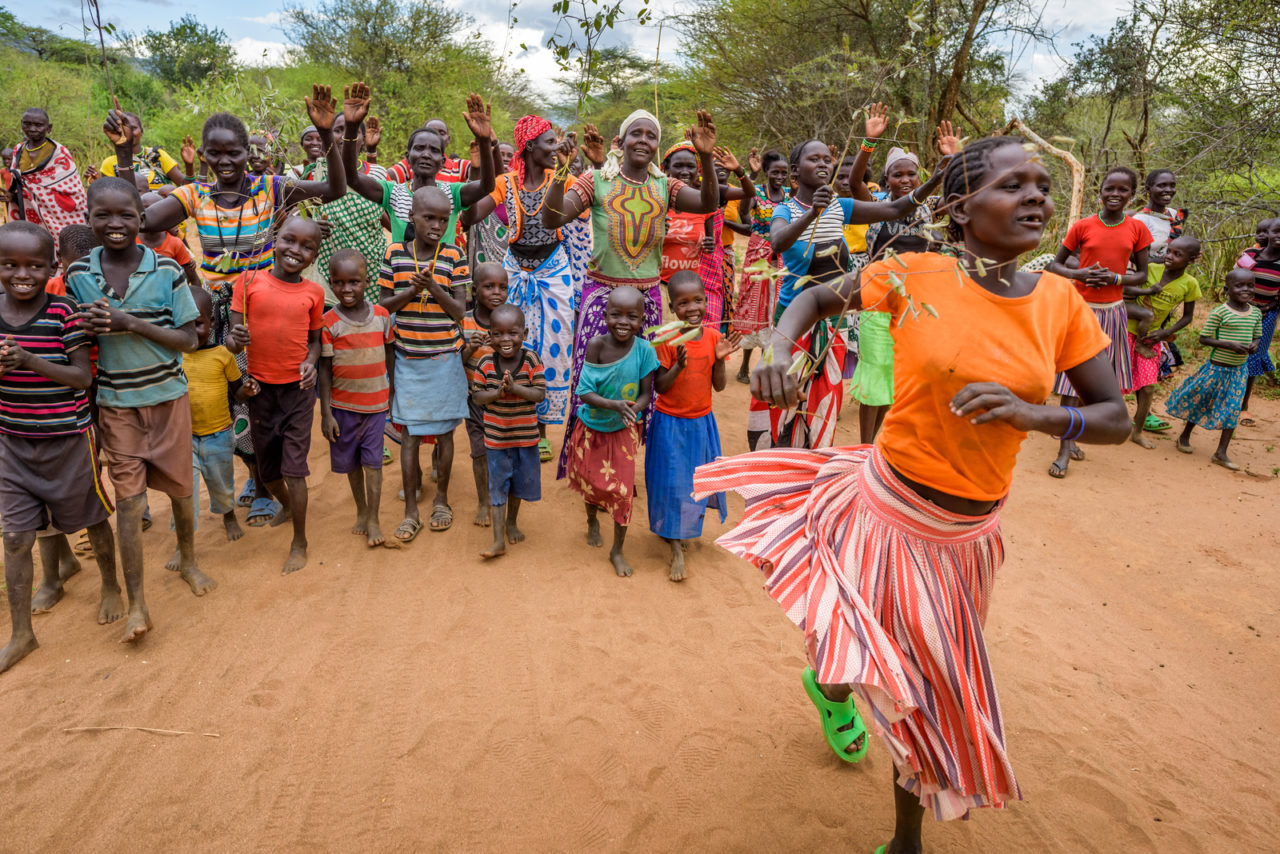
Blessings overflow
As morning dawned on the momentous day, Cheru was right up front — eyes bright with amazement as the clean water flowed. She watched her father be the first to fill a glass and drink from it as everyone cheered.
Cheru’s mother recalls the exhilaration surrounding the scene. “That day when the water first came, we ran to our houses and brought jerrycans to fetch the water because we thought the water would get finished,” says Monica. “But seeing the water the next day, I went to my neighbors and I told them: ‘You all come and fetch, and bring your clothes to wash. The water is not getting finished.'”
With water close at hand, families can prioritize other critical areas in their lives: health, education, and income. Monica’s mind is brimming with new ideas. She wants to grow a vegetable garden and start a business selling clothes and sugar. Cheru dreams of becoming a doctor.
As a water committee member, Samson’s top priorities are toilets and bathing facilities. “This will change everything,” he says. “We have a toilet now. All the water committee members are going to have them, and we’ll see that others do too.”
With his arms around Cheru, Samson praises God for the joy that has come to his family because of clean water. “We’re happy. The animals are happy. Even the birds are happy,” he says, breaking into a wide grin.
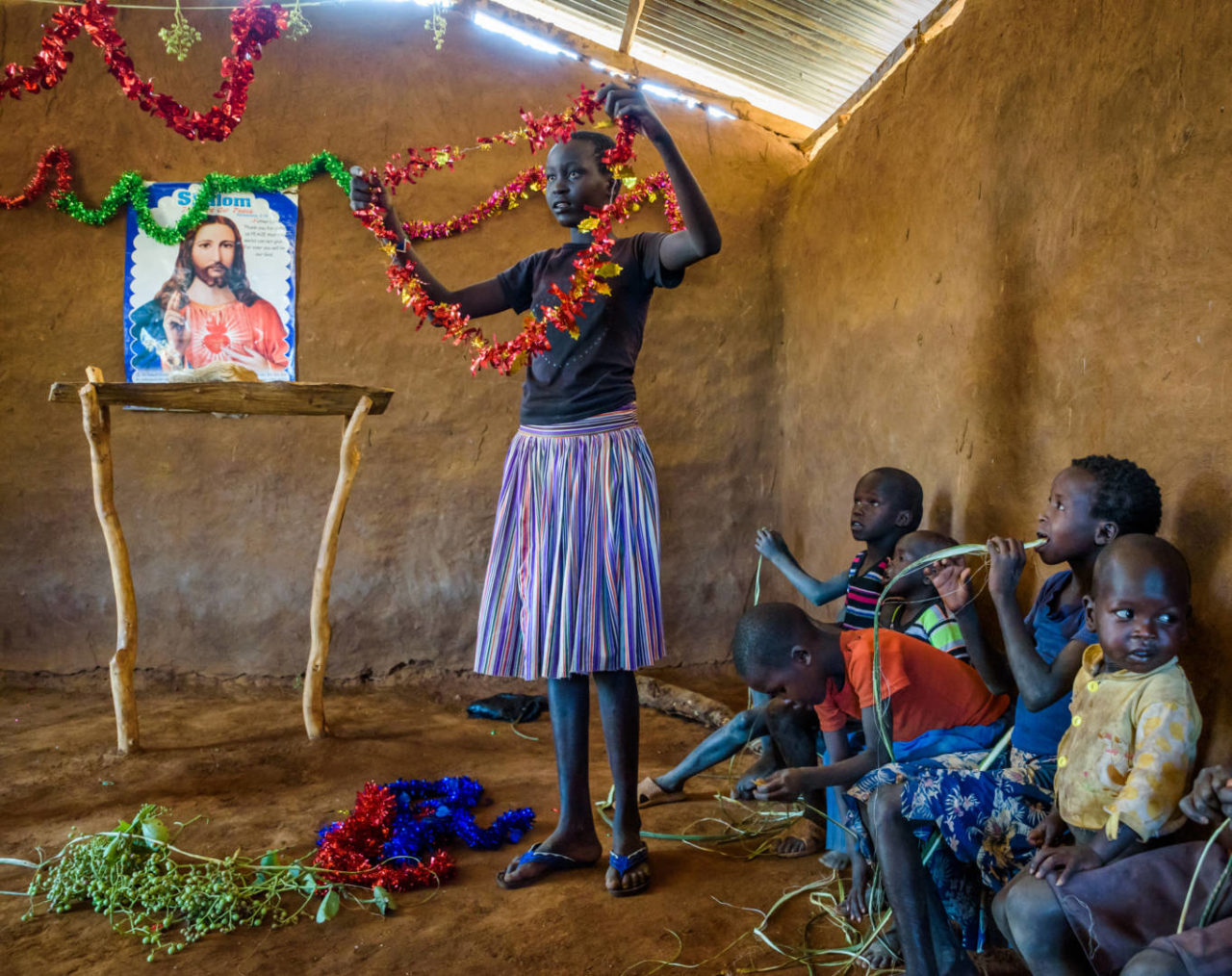
Rejoicing in God’s bounty
On Sunday, when Cheru hears Pastor Solomon Kapel beating his drum, she excitedly runs to find him. She wants to be the first in line to help him cut flowers and branches to decorate the church before the service begins.
As the congregation gathers, women place jerrycans of water by the door so anyone can get a drink when they’re thirsty. Then they sprinkle the dirt floor with water so they won’t kick up dust when they dance and sing.
The church overflows with worshippers, children and adults alike dressed in their best. Cheru loves church. She joins in wholeheartedly to sing, dance, and praise the Lord.
“Water has changed everything here for the better,” says Solomon. “We praise God for it.”
He is deeply moved at the blessings that have come with clean water. Without hesitation, the congregation hauled water and applied a new mud finish to the church exterior. They’re saving money for sacks of cement so they can have a concrete floor. Monica and other mothers want to start a childcare center at the church; Samson says they need to build a latrine; and there’s even talk of building a house for Solomon, since he currently lives 7 kilometers (over 4 miles) away.
Solomon says, “Just like in the Bible where God gave his people water from the rock, this water system is a blessing from God.”
When the children’s choir comes forward, Cheru proudly stands in the front row — her clean face beaming. She sings and claps with joy.
For Cheru, it’s a refreshing new day.
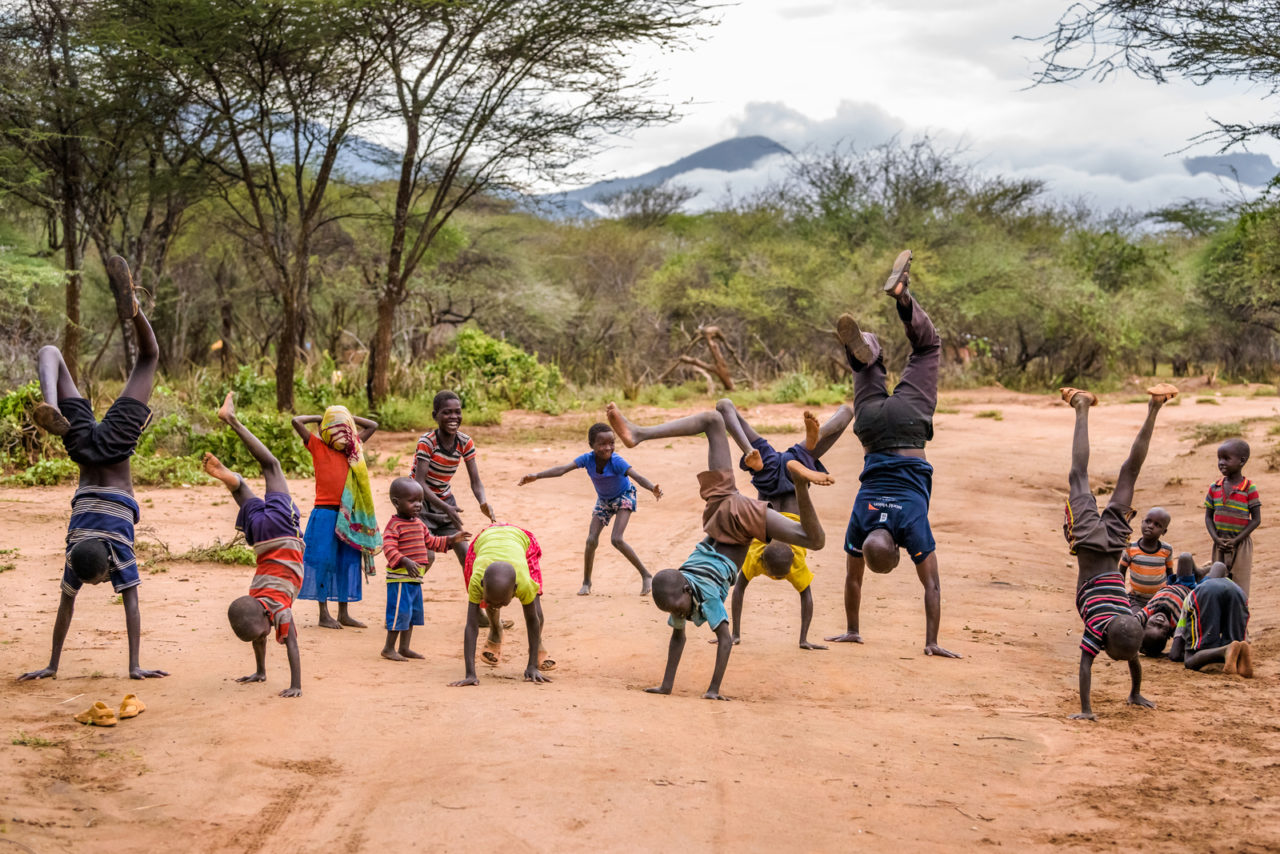
How you can help children like Cheru
- Learn more about clean water and how you can be part of the movement to end the global water crisis by 2030.
- Join us in praying that more and more communities would have clean water access, and thank God for the access to clean water gained by this community.
- Walk or run the Global 6K for Water on May 4, 2019, to provide life-changing clean water to one person in need. You’ll walk or run with the picture of the child receiving clean water through World Vision’s water projects.
- Give a monthly gift to provide clean water to communities lacking it. Your ongoing gift creates lasting change in a community.
